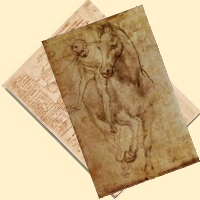How had Leonardo gotten to that point, he, the atheist who rejected the external signs of the Christian religion, made fun of Christians, calling the cult of saints superstition, and recommending that statues and paintings be made rather to honor the virtuous people of one’s time, because only they were the true saints on earth? The atheist who had said, "And if we doubt the certainty of each of the things that passes through our senses, how much more should we doubt the existence of God and the soul and other things of that nature, for which discussion and controversy is unceasing."
The explanation seems to be in Leonardo's relentless spirit of inquiry. He had noticed that the same physical laws regulated the whole universe, and particularly the living body. "This earth, he wrote, is so perfectly ordained […] that it is impossible that a single mind should not have created it." The bones and muscles of men and horses are the same, the behavior of animals imitates that of man in so striking a way that it seemed to Leonardo that the same brain had made of them illustrations, caricatures of the vices and virtues of men. He had assembled 44 stories about the habits of animals, some of which were myths, and used them to illustrate, here a human vice, and there a human virtue. In his drawings, he often made analogies between men and animals.
One day, speaking of the eyeballs, he cried out, “O powerful action! What spirit can penetrate your nature? What tongue will know how to express that marvel? None, for sure. That is where human discourse turns to the contemplation of the divine." If the admiration of nature led Leonardo to believe in God, it also led him to love him and obey him, to the point of forgiving those who had offended him: "I obey Thee Lord, first for the love I ought, in all reason to bear Thee; secondly for that Thou canst shorten or prolong the lives of men."
Adapted, with permission, from La Renaissance en Question, Tome I, Lina Murr Nehme, Aleph et Taw
